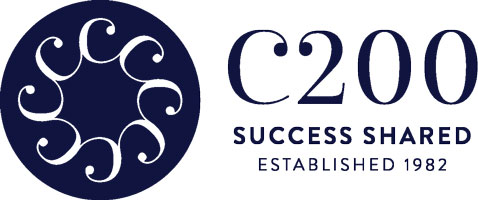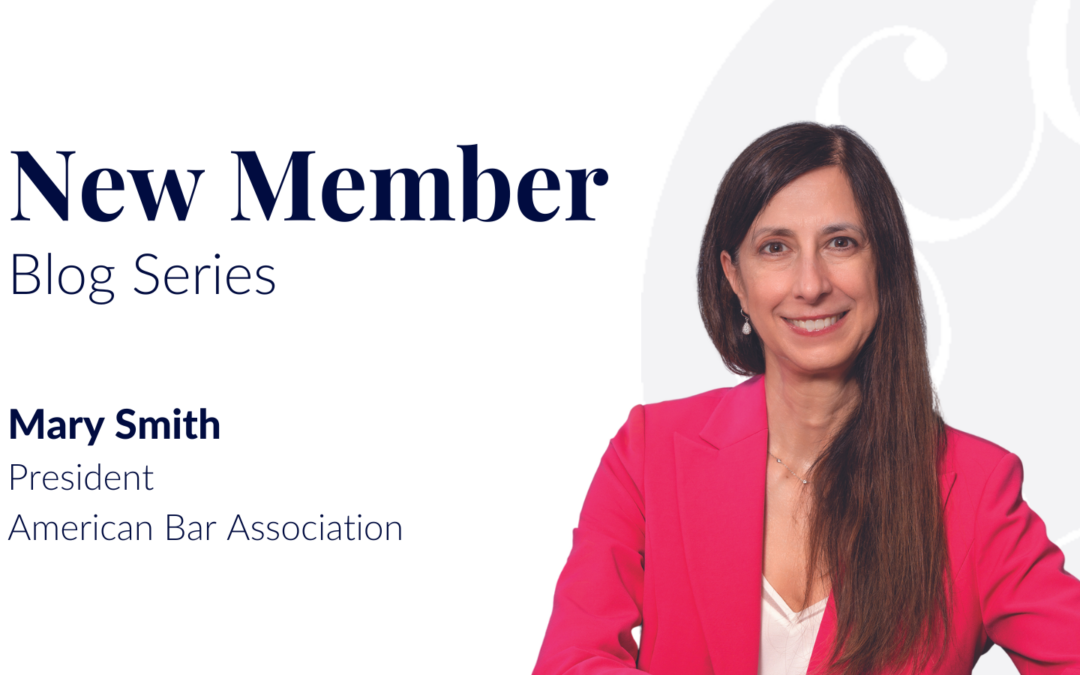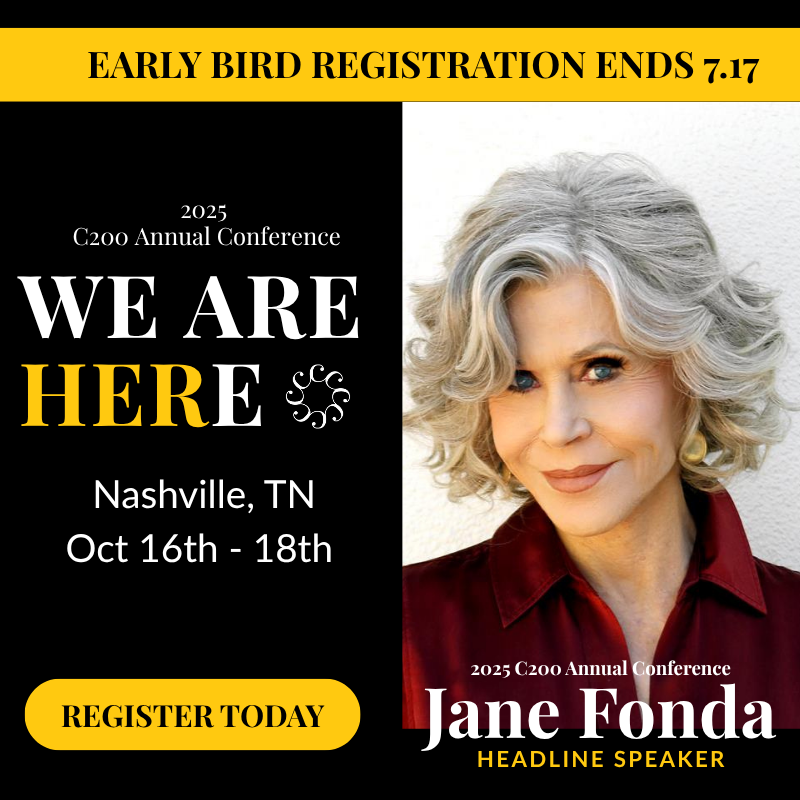Mary Smith is Co-CEO of the Tribal Abatement Fund Trust, managing over $1 billion in settlement funds to address the opioid crisis in the United States, particularly in Native American communities. She is also President of the American Bar Association and is the first Native American woman to hold the position. Mary’s undergraduate degree was in mathematics and computer science, but she ended up with a career in public service due to her passion for helping others. Outside of work, she enjoys traveling and is inspired by meeting new people. Mary has been a member of C200 since September 2023.
Eva Glassman: Can you please describe your work? What industry do you work in?
Mary Smith: I am the president of the American Bar Association, the largest voluntary Bar Association in the world, and am the first Native American woman to hold this position. I serve as an independent director of a global biopharmaceutical company, PTC Therapeutics. I am also Vice Chair of the VENG Group, a national consulting firm that offers multidisciplinary and technologically driven approaches to problem solving. Finally, I also serve as Co-CEO of the Tribal Abatement Fund Trust, overseeing the distribution of $1.5 billion worth of opioid settlements to Native American tribes across the country.
EG: That is incredible work, and so is the rest of your career journey—you’ve worked in the White House! What I find most interesting is your educational background in technology, math, and engineering. How did you end up in law?
MS: I actually didn’t grow up wanting to be a lawyer, nor did I imagine devoting much in my career to public service. I grew up in a family where neither of my parents went to college. My dad quit high school to join the Navy during World War II. My mother was a gifted student who graduated high school when she was 16, but she did not attend college even though her three brothers did. I know I’m biased, but I think my mom was smarter than all her brothers. She didn’t go to college because it was a time when girls really didn’t do that.
My undergraduate degree was mathematics and computer science. I enjoyed all subjects, but I majored in mathematics and computer science because I knew that I would be able to have a career in that field. I worked as a systems programmer for a few years after college. The part of my job that I enjoyed the most was helping people with computer problems. I realized that I wanted to help people in broader ways, and that is when I thought about going to law school.
After working as an attorney at the US Department of Justice for a few years, I became fascinated with politics and public service, so I offered to volunteer on a presidential campaign. I sent a letter saying that I would quit my job to volunteer full time for the campaign, and I was offered a position.
I subsequently was very fortunate and honored to get a position in the White House to work on policy issues like equal pay for women, domestic violence and sexual assault, homelessness, civil rights issues, Native American issues, and consumer issues. After the White House, I worked at a Fortune 200 company in a senior role and also worked in a senior role in a gubernatorial administration in Illinois.
Later, I was offered the position of being CEO of the Indian Health Service, a $6 billion agency with more than 15,000 employees that provides healthcare to over 2 million Native Americans around the country. Part of the reason I took the position was to honor my Native American grandmother who grew up in a family of 16 children, only 10 of whom lived above the age of three due to lack of adequate access to healthcare.
EG: I love how mission-motivated your career journey has been. What do you think is the biggest factor that led to the success of your career and having these really amazing and impactful roles?
MS: I didn’t have a grand plan for how I wanted things to turn out. I had some plans, but I think it was being open to unexpected opportunities and seizing upon them that got me to where I am. I wasn’t afraid to stretch myself and feel uncomfortable in a new role. Wherever I was working, I continually tried to make a difference to help people and further the mission of the organization.
EG: I really appreciate the strong thread through all your experiences: your passion for helping people, which stretches all the way back to your job in computer science. Every member of C200 shows this passion because they’re part of an organization where helping people—women in business in particular—is the bottom line.
Speaking of C200, how did you get involved? How did you hear about C200 and what drew you to the organization?
MS: I knew some amazing women from Chicago like Christie Hefner and Donna Zarcone who are members of C200. I was drawn to C200 because of the fabulous women who are involved in the organization.
Before I was a member, I attended the Annual Conference in Chicago in 2022, including one of the dinners with a great group of women. It was a wonderful evening because we had honest and genuine conversations about work, family, the pandemic, and relationships.
Around the same time, which was after I left the Indian Health Service, I was beginning my board journey in earnest. During this time, I met two people who later became my nominators to C200, Joan Steele and Jan Babiak. They helped me tremendously with my board journey.
My experience at the 2022 Conference and working with Joan and Jan on my board journey showed me the power of the C200 community.
EG: Because C200 is about women helping women, it’s in part about mentorship. I was wondering about your own mentorship experiences going up in your career, particularly with other women. What women are inspiring to you and why?
MS: I have had many female mentors who helped me in all stages of my career. One of them was and is Judge Ilana Diamond Rovner for whom I interned during my first summer of law school. We’ve stayed in touch throughout my legal career, and she’s always been very supportive.
Another person who has been an inspiration and mentor to me was Wilma Mankiller, who was the first Native American woman to be principal chief of the Cherokee Nation. She led an amazing life and made lasting contributions to the Cherokee Nation. She knew the power of making the impossible possible.
EG: In your experience, what does it mean to be a woman in your field? How does that affect the way you go about your professional life, if at all?
MS: Part of being a woman in business means bringing up people behind you, because no one ever gets to where they are by themselves.
EG: How do you enjoy spending your time outside of work?
MS: I enjoy traveling. I currently am planning to go to Japan with some friends, and I am looking forward to having sushi at the docks and enjoying Japanese culture. I also really want to go to Easter Island someday to see the Moai—maybe that’s my next trip after Japan.
The other thing I like to do for fun is just meet new people. Even during the pandemic when people weren’t going out, I was able to meet a lot of people virtually. In fact, that’s when I met Jan Babiak, through a webinar.
EG: What is your advice to aspiring female business leaders as they work to advance their own careers?
MS: Stay true to and believe in yourself. It’s more important to listen than to talk, but you really have to listen with active listening.
In my experience, one of the hardest things to do is differentiate between criticism that’s valid and criticism that you can ignore. It’s easy to get bogged down by people who criticize what you’re doing, so it’s important to know when to stay focused on meeting your goals and when to be honest with yourself and say, “You know what? That is really valid, and I need to work to overcome that.”
EG: Why C200? What are you most excited about now that you’re a member? In your experience so far, what does being a member of C200 mean to you?
MS: To me, being a part of C200 is a unique mix of continuous learning and a sense of community. At its core, C200 is about women helping women.
Through C200, I have made some connections with some incredible women who I otherwise would never have met. I think the older we get, it’s harder to make new friends, but C200 instantly gives you an opportunity to connect with people who have lived interesting lives and who are really making a difference.


